Greenhouse cultivation, scale-up, glass, and LED lighting have been the topics of symposia organized by Horti-Consult International in recent years. At the same time as celebrating the cultivation consultancy company's 25th anniversary, it was all about energy on Thursday afternoon.
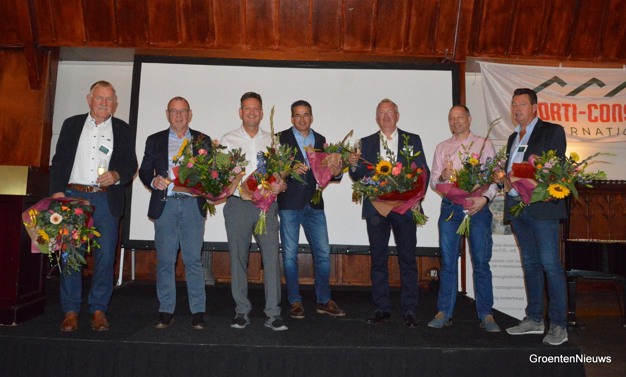
The seven advisers: Jan Verbaarschot, Jan Banken, Gilbert Heijens, Marco van Noord, Ton van Kessel, Pieter Schoenmakers and Wilbert van Oers.
About every five years, the cultivation consultancy organizes a symposium, at which the now seven cultivation consultants boast of 'predicting' developments with a wink. Emphatically with a wink because the men do not like to sing their own praises.
Nor do they like being the center of attention. Yet they didn't quite escape that yesterday at their party at Heerlijkheid Mariënwaerdt Estate in Beesd. Jan Banken presented a piece of horticultural and business history. He also reflected on the 2017 death of colleague Ruud van Amersfoort. After receiving flowers and kisses, it was then time for the theme section.
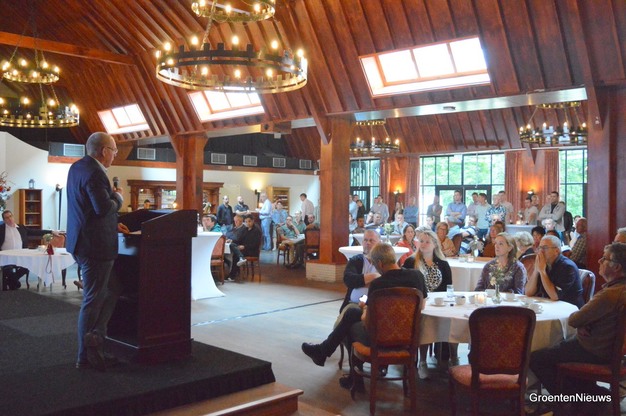
Jan Banken speaking.
Alternative to fossil CO2
Nick ten Asbroek of engineering firm NAMTA Renewable Energy & Sustainability walked through the various options for CO2 capture with the room full of growers. He noted an increase in the use of liquid CO2 as well as CO2 capture and storage. That capture can come from different sources (waste incinerators, biogas, biomass, or directly from the air) and in different ways. And that is just as well because Nick predicts a sharp decline in the supply of fossil, 'cheap' CO2.
In detail, the owner of the engineering firm discussed projects at growers in Sirjansland (DES) and at Wijnen Square Crops (in Egchel). They capture CO2 themselves after burning biomass and also exploit the heat. In the Dutch situation, Nick says an area of about 20 hectares is needed for it to be profitable. Internationally, it is already possible with smaller acreages, as CO2 prices are different here.
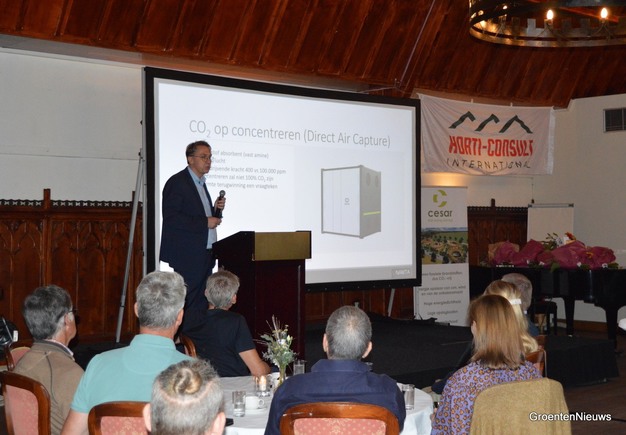
Nick ten Asbroek also sees growers looking at liquefying CO2 themselves to possibly supply to others. Not cheap, so he then definitely advises making good supply arrangements.
Heat battery
The second speaker was Gonnie van der Vorst. She had been on stage before the 'honoring' of the cultivation advisers, but later in the afternoon, she was allowed to introduce the audience to Cesar energy storage's heat battery.
Meanwhile, the first residential houses are already being heated with Cees van Nimwegen's invention. Using a calculation example, the inventor showed how the Cesar heat battery can be an interesting investment for activities where large-scale heat is needed regularly. Especially now that there are an increasing number of hours with negative power prices, which means that recharging the battery (with concrete instead of water because of its higher capacity for heat absorption) can be cheap.
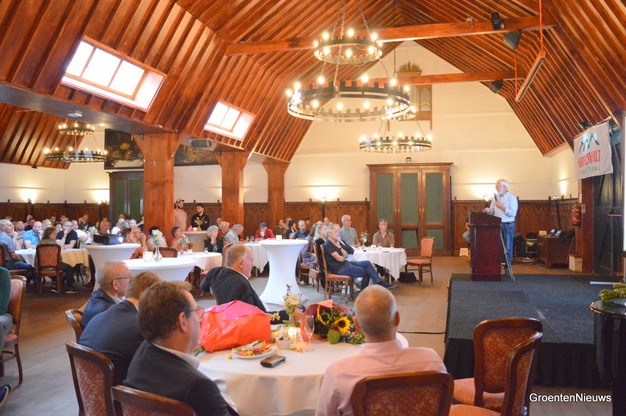
Cees van Nimwegen talks about the Cesar heat battery.
Hydrogen import
Whereas the first two speakers came to explain to the room full of growers how they can start using energy in new ways, Robert Willemsen of Essent chose not to give the room too much short-term hope in his talk on hydrogen. Hydrogen is not the answer to horticulture's energy problems, he was adamant. After all, hydrogen is expensive and has logistical challenges, and when it comes to large-scale, horticulture will not be at the front of the queue of recipients.
Robert explained that Essent and Nuon are working together to make hydrogen attractive. To do so, they are looking beyond their own borders. Making hydrogen abroad, where the electricity is cheaper and so is the land, is what they are aiming for. Robert mentioned countries like Canada and Morocco.
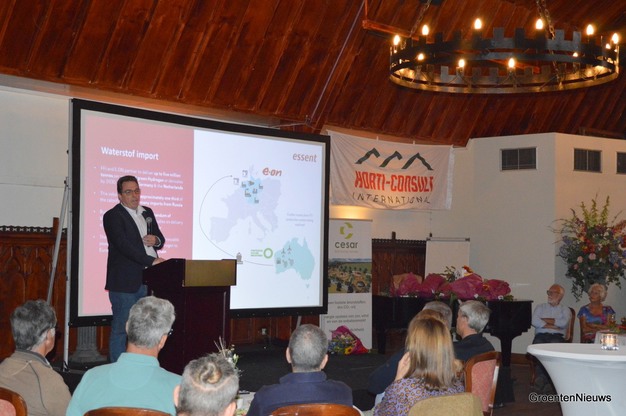
Robert Willemsen of Essent does not believe in hydrogen for 'full steam ahead' in horticulture.
How the hydrogen should then get here from those countries is still a logistics issue. Instead of transporting pure hydrogen, reacting hydrogen with ammonia, resulting in ammonium hydroxide, is an alternative. As with LNG, it could then come this way by tanker.
Perhaps as early as the end of 2026 or else in 2027, the first tanker carrying ammonium hydroxide should arrive at the port of Rotterdam. Terminals are being built for this, as well as 'crackers,' installations that convert the ammonia back to hydrogen.
Such crackers could also be installed locally at growers' premises. One advantage: unlike electrolysis, a cracker does not require a large electricity connection. A disadvantage: prices for ammonia are still far too high, according to Robert. Prices have to come down by at least 60 percent if he wants to see local cracking for hydrogen production in the future. In the next five to seven years, Robert doesn't see hydrogen being used on a large scale in horticulture.
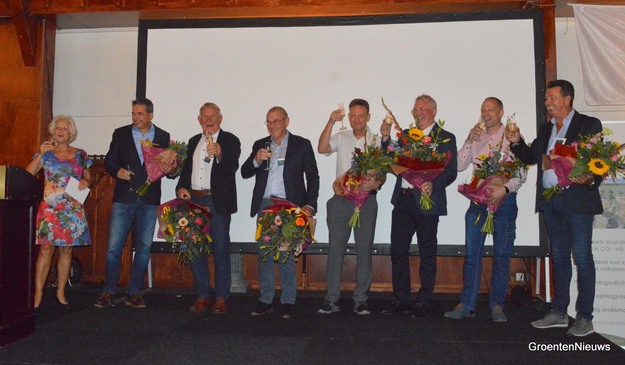
Toasting to the future, with Gonnie van der Vorst of Cesar energy storage on the far left. She called the men on stage one by one and also had a special speech prepared for the women of the Horti-Consult gentlemen.
View outside Benelux
In his opening speech, Jan Banken also cast a glance into the future on behalf of his Horti-Consult colleagues. Another study trip, the nineteenth already, is in the near future. A report on the trip will appear again on this channel in due course.
What the crop consultants invariably see on their trips is that 'we're not doing so bad here.' At the same time, several countries do come closer. Reason enough for the team of crop consultants not to close their eyes to foreign countries and to provide crop advice there in the years to come, in addition to the continued focus on the Benelux. On to another five years, with robotization as the theme then, perhaps? "It's hardly progressing," Jan was adamant. "While it is badly needed."
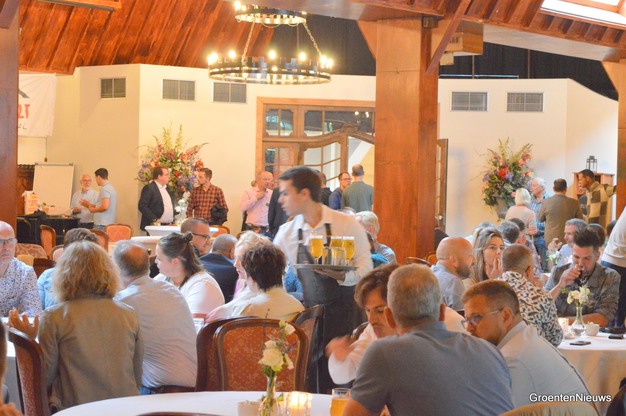
After the theme afternoon, it was time for drinks and dinner.
For more information:
Horti-Consult International 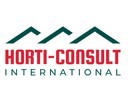
[email protected]
www.horti-consult.nl
